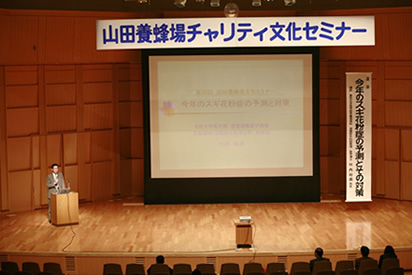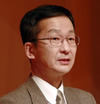 |
|
 |

 |
|
On Saturday, February 25, 2006, Yamada Bee Farm sponsored its 30th culture seminar, welcoming Tottori University Medical School’s assistant professor Dr. Hiromi Takeuchi. |

Dr. Hiromi Takeuchi of Tottori University Medical School discussed this year’s allergies and ways to handle them in his talk, “Prediction of this year’s cedar allergies and how to deal with them.”
[Presentation Details]
It is said that in general the dispersal amount of pollen is affected by the weather of the previous summer. This year is 10-20% higher in pollen than in the previous year, and is the result of a summer that was colder than the typical year. Japanese Cedar generally begins its dispersion around Valentine’s Day (February 14), peaks on March 3, and finishes around the Japanese “Golden Week”, the beginning of May. As people who suffer from Cedar also are affected by Cypress, this three month period of allergies results in quite a bit of discomfort.
Cedar allergies produce an allergic reaction through an antibody called IgE, though some people who have the antibody do not display symptoms. Atmospheric pollution and an increase in pollen are considered the external sources contributing to the problem, and one theory propositions that an excessively sanitary lifestyle may be a contributor. There are many ways to deal with and treat the problem, such as wearing a mask to prevent pollen from entering the body, using antihistamines or medical steroids, or slowly exposing the body to pollen in order to build up immunity to it. Surgical methods have recently been developed that use lasers and minimize the burden on the patient. Additionally, experience shows that many people have felt the effectiveness of certain foods and health food products, and collaborative research between universities and health food makers in several fields is underway. In order to deal with allergies, I believe it to be best to look at each individual’s condition and make good decisions for treatment.
|


|
|
< Profile – Dr. Takeuchi >
Assistant Professor, Tottori University Medical School Department of Ear, Nose, and Throat, and Department of Head and Neck Surgery.
Graduated from Tottori University Medical School in March 1981. In 1986, he received his Masters Degree from the Tottori University Medical Research Department, and as a researcher under the sponsorship of the Ministry of Sports, Science, Culture, Education ,and Technology, has been a research fellow at Tottori State Central Hospital, including studying abroad at England’s Wales University.
Member of the Japanese Ear, Nose, and Throat Association, and an advisory member to the Japanese Allergy Association.
Principle research interests are clinical research in nasal allergies and microscopic nasal surgery. |
|

 |
| Yamada Bee Farm continues to sponsor the “Yamada Bee Farm Culture Seminar”. |
 |
For inquiries regarding the culture seminar, please contact the administrative department of the Yamada Bee Farm Culture Seminar,
Domestic telephone 0868-54-3999
during the hours of 9:00 AM - 6:00 PM
Monday through Friday. |
|
 |
|
 |
 |
 |
|
 |



